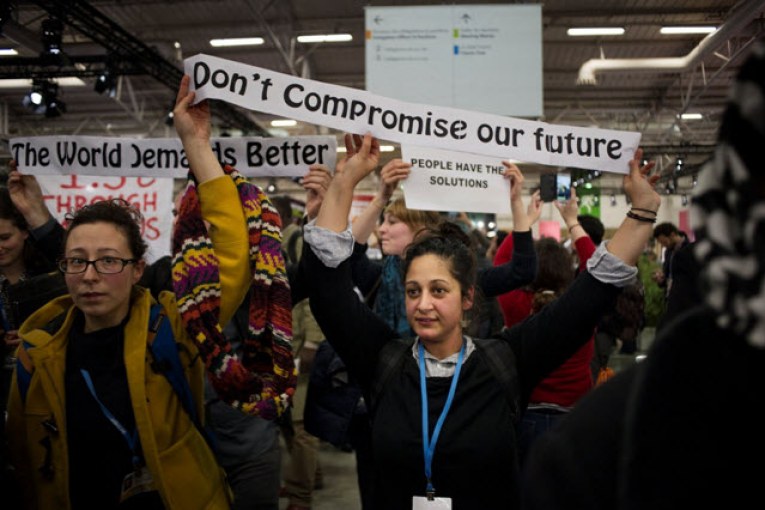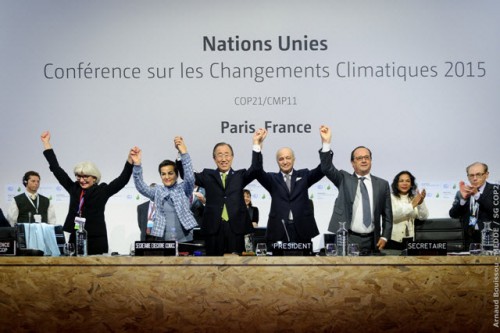
 By Debra Chase
By Debra Chase
Inextricably connected – every little inch of earth and sky– every life form – large or small – neglect one part and it all breaks down. This was the overlying message at the December 2015 Paris talks. Yet these talks were not meant to develop a sweeping blueprint to save the planet from the devastation of climate change. Instead, it was a way to send a strong message to world leaders, major corporations and the people of the world that combating climate change is serious business. And a historic agreement was created.
On April 22nd, 2016, World Earth Day, over 130 countries will meet in New York to sign the historic Paris agreement. Included in the list of countries scheduled to sign the Paris agreement are the major contributors of greenhouse gas emissions that are causing global warming: China, United States, Japan, India, Brazil, Australia and many European Union countries including Germany, France, the United Kingdom, Italy and Spain. The agreement sets a collective goal of keeping global warming below 2 degrees Celsius (3.6 degrees Fahrenheit) compared to pre-industrial times, and to pursue efforts to limit the temperature rise to 1.5 degrees Celsius (2.7 degrees Fahrenheit). It requires all countries to sign the agreement and submit plans for climate action within one year and to update those plans every five years. (Though such plans are not legally binding).
This is a high-level signing ceremony, assembled by UN Secretary-General Ban Ki-moon and signifies the first major step in executing the Paris Agreement, adopted December, 12 2015. Countries can sign the agreement until April, 2017. Once signed they will need to adopt or ratify the agreement within their own legal systems. Once a minimum of 55 countries sign the agreement it will enter into force representing at least 55% of global emissions.
The ceremony is taking place April 22, 2016, World Earth Day and, while the signing of the agreement is the focus of the day there are many other activities taking place; a one-hour opening ceremony will feature world leaders, youth, civil society and private sector representatives; separate sessions for national statements and; a discussion that will view how various sectors are going to implement their plans vis-à-vis the agreement. The Paris talks proved that Climate change deserves our greatest possible attention. The question is – did we wait too long to act?
The global heat wave has continued since the Paris talks in December, and it appears that average temperatures across the Northern Hemisphere have breached the 2 degrees Celsius above “normal” mark for the first time in recorded history, and likely the first time since human civilization began thousands of years ago. This is a major sign post for humanity. The benchmark of 2 degrees Celsius has been the point above which, climate change may begin to become dangerous to humanity. It has arrived, albeit briefly, far more quickly than originally projected by climate scientists.
- Within the last 6 months Coral Reefs across the globe are dying at an alarming rate and scientists tell us, some of them in tears, that if we don’t do something now that radically changes the ocean temperatures – the coral reefs will be gone forever – they won’t be able to recover. This could mark the decline of 25% of the world’s fish protein, consumed by humans.
- For the sixth month running, we’ve had a month that has broken the global high temperature record. And not just broken it, but crushed it, shooting through it like the previous record didn’t even occur.
- .According to NASA’s Goddard Institute for Space Studies, March 2016 was the hottest March on record, going back 136 years. It was a staggering 28°C above average across the planet. The previous March record, from 2010, was 0.92° above average. This is a huge jump, the greatest margin ever seen for any given month. (At such planetary temperatures, should they continue, sea levels would rise high enough to submerge several small island states).
- Data from the Antarctic is showing that ice sheets will destabilize (melt) much faster than originally thought, placing all major coastal cities at risk in this century.
- More species are going extinct or being placed on the UCN endangered list. Experts predict that one-fourth of Earth’s species will be headed for extinction by 2050 if the warming trend continues at its current rate.
Welcome to the new normal, and our new world. For too many years the fossil fuel industries’ political power has prevented action and we can no longer afford to allow it to continue, we are simply running out of time. Once the planet hits 2degrees, there is no going back. We are locked in. The irony is that the technology is available to change course, but, the will to change course is not yet strong enough. In other words, there is not a country in the world that’s on track to reduce emissions to the extent needed to keep global warming under 2 degrees Celsius (3.7 Fahrenheit).
But there are some that are climate leaders, and tiny Denmark ranks the highest with the UK close behind. The 2016 Climate Change Performance Index shows the tiny nation near the top in battling the ravages of global warming whilst the United States ranks 31st with Australia just third from the bottom… Saudi Arabia. This is of course not about winners and losers but about leaders and if a tiny country like Denmark can make the drastic changes that it has then surly the rest of us can follow – as quickly as possible.
As 350.org founder Bill McKibben states: “Its starting to shift, global efforts like the fossil fuel divestment campaign have begun to shift financiers away from coal and oil and gas. Given the science, we have to speed things up”.
Climate Change is a verb created by humanity that is desperately seeking the human heart connection of a noun: LOVE.
Climate change hoax:
http://www.investors.com/politics/editorials/father-of-global-warming-admits-it-used-to-be-hotter-than-it-is-now/
http://www.cnsnews.com/commentary/james-wanliss/shining-light-settled-science-there-no-climate-crisis
A lot of problems with the science in these articles and more importantly the conclusions drawn from it, but since you don’t understand the science, there’s no point in discussing this with you. Continue to believe what you believe.
Think about this – if you have to back 120,000 years to find a warmer period, that’s a pretty catastrophic even.
If we had a 120,000 year flood, drought, cold, I think we would be alarmed not relieved.
Climate change is real… as is continental drift… any ‘deniers’ of continental drift only need to look to the last week, where Japan and Columbia have had major earthquakes…
The arguable thing(s) are whether climate change and/or continental drift are predominately related to things humans have done, and/or can change… am pretty sure some opponents of ‘fracking’ will cite the recent earthquakes as a causative factor…
I wonder what the point of all that was…
hpierce: Climate change is real… as is continental drift… any ‘deniers’ of continental drift only need to look to the last week, where Japan and Columbia have had major earthquakes…
Geologists would quibble with you and say the you really mean to say plate tectonics, rather than continental drift. There’s actually a difference.
It sounds like, what hpierce is trying to say, is that ice sheet melt causes earthquakes. That is true science. So far though I have seen no reports from science that the current large quakes in Japan and Ecuador were caused by ice sheet melt. The pacific rim of fire is definitely active.
What if: VEGANS are right, the Methane problems is coming from too many cows?
What IF: the Global Warming Problems is.. too many PEOPLE? Humans breathing?
“too many PEOPLE? Humans breathing?”
Humans disregarding the simple fact that we are animals totally dependent on an environment ( the world) with limited resources that we seem to be determined to deplete as rapidly as possible with our “more consumption is better” attitude.
In many respects the entire world economy/banking system is a giant Ponzi scheme, completely reliant on continuing growth into the indefinite future–and when the growth stops, everything crashes the way it is set up now–some genius will be needed to figure out how to transition to very low growth rates without a huge crash…
re: “March 2016 was the hottest March on record, going back 136 years. It was a staggering 28°C above average across the planet.”
Someone needs to proofread before posting–at 28C above average, most of us would indeed be toast! Presumably this should be 2.8C above average; still significant!
Your right TribeUSA, it should have read “1.28 C above average” …still a daunting number.